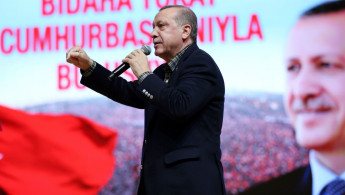Turkish president accuses Germany of 'Nazi practices'
Turkish President Recep Tayyip Erdogan on Sunday accused Germany of "Nazi practices," days after German authorities prevented Turkish officials from addressing pro-Erdogan rallies, deepening existing tensions between the two countries.
Turkey had planned to have government ministers address rallies in Germany and the Netherlands in support of an upcoming constitutional referendum that would give Erdogan new powers.
There are about 1.4 million people in Germany who are eligible to vote in the Turkish referendum.
On Thursday, Turkey's justice minister canceled a meeting with his German counterpart after local authorities in southwest Germany withdrew permission for him to use a venue to hold a rally near the French border that was part of a campaign to get Turks in Germany to vote "yes" in the referendum.
Turkey's economy minister, Nihat Zeybekci, was due to speak at two events in western Germany on Sunday.
Speaking in Istanbul, the Turkish president fanned the flames with a stinging verbal attack.
"In Germany, they are not allowing our friends to speak. Let them do so. Do you think that by not allowing them to speak the votes in Germany will come out 'no' instead of 'yes?'" Erdogan said.
"Germany, you don't have anything to do with democracy. These current practices of yours are no different than the Nazi practices of the past."
Julia Kloeckner, a deputy leader of Merkel's Christian Democratic Union, told the German daily Bild that Erdogan's Nazi comparison was "a new pinnacle of immoderation."
"Mr. Erdogan is reacting like a stubborn child who can't get his own way," she told the paper.
Relations between Ankara and Berlin have been strained since a failed military coup on 15 July 2016.
Ankara has launched a vast crackdown in the aftermath of the failed putsch, which has seen more than 100,000 people arrested, dismissed or sacked for alleged links to the plotters or to Kurdish militants.
Authorities in Berlin are demanding the release of Deniz Yucel, a German journalist with Die Welt detained in Istanbul over reports written in the aftermath of the attempted coup.
Meanwhile Ankara has demanded that Berlin extradite alleged supporters of Fethullah Gulen - who Turkish officials say was the mastermind of the July 15 coup attempt. A request that has been been turned down by German officials.





 Follow the Middle East's top stories in English at The New Arab on Google News
Follow the Middle East's top stories in English at The New Arab on Google News


![22 Arab countries at COP29 have rejected the targeting of fossil fuels [Getty]](/sites/default/files/styles/image_330x185/public/2024-11/GettyImages-2184289638.jpg?h=199d8c1f&itok=ptHl5bec)